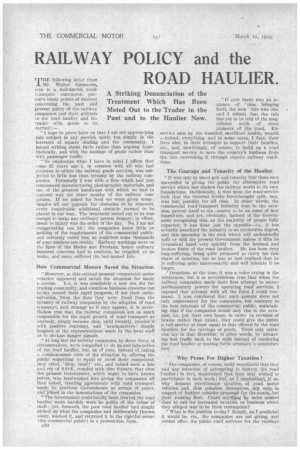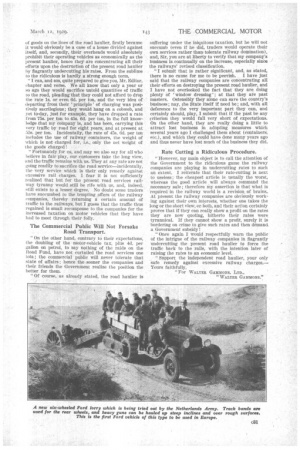RAILWAY POLICY and the ROAD HAULIER.
Page 60

Page 61

If you've noticed an error in this article please click here to report it so we can fix it.
rpm?, following letter from _L Mr. Walter Gatranons, \filo is a well-known road ft anspolt cont./ actor, prebents many points of interest concerning • the past and -present policy of the railway compantes and their attitude to. the road haulier and the trader with goods to he, carried
"I hope to prove later on that I am not approaching this subject in any peevish spirit, but simply in the interests of square dealing and the community. I intend writing about facts rather than arguing hypothetically, and with the haulage of goods rather than • with passenger traffic.
" To emphasize what I have in mind I affirm that t:oum 25 years ago 1, in common with all who had oce.asion to utilize the railway goods services, was subjected to little less than tyranny by the railway companies. Personally I was with a firm which had just: commenced manufacturing photographic materials, and one of the greatest handicaps with which we had to toptend was the sheer apathy of the railway companies. If we asked for food we were given stone ; despite all our appeals for obstacles to be removed, every conceivable • additional obstacle seemed to he placed in our way. The treatment meted out to us was enough to make any ordinary person despair ; in effect, insult to injury was the order of the day. No, I am not exaggerating one bit; the companies knew little or nothing of the requirements of the commercial public, and certainly cared less, as doubtless some thousands of your readers can testify. Railway workings were on . th.e li,nea of the Medes and Persians, hence ordinary businesS concerns had to conform, be crippled, or go and many suffered the last-named fate.
How Commercial Motors Saved the Situation.
" However, at this critical moment commercial -motor vehicles appeared and saved the situation for any c.A.cerns. Yes, it was absolutely a new era for the trading community, and countless business concerns can to-day record their rapid progress, if not their entire -salvation, from the date they were freed from the tyranny of railway companies by the adoption of road transport, and, strange as it may appear, it is neyertheless true that the railway Companies are asmuch responsible for the rapid growth of road transport as anybody, simply because they, until recently, treated-it -with positive contempt, and hcadtjuarters 7 simply laughed at the repreSpntations made by the local staff
as to obvious danger Signals. • • • •
" At long last the railway companies, by sheerforce of circumstances, were compelled ta sit up andtakenOtice of .the„road haulier, but, as of .Yore, instead 4,1a:icing 'a common-sense viewofthe situation by offering • the ..public. something to equal: or excel Aheir competitor: -_they cried,. Stop, thief! etc.. etc.. and raised such a hue :In ;I., cry.of S.O.S., coupled with dire threats, that even 'the present Government,' which ought to have known better, 'was ItoOdwitiked. into giving the companies all :they aSked, treating agreements with road transport 'made by previous Governments as scraps of paper, arid joined in the lamentations of the companies. "The Clovermnent could hardly have.treated the road haulier more harshly were he -guilty. of. the Crime of theft; yet, forsooth, the poor road haulier had simply picked up what the companies had deliberately thrown away, washed it, and returned it to the rightful oWner (the commercial public) in a presentable form.
c30 "If ever there was an in stance of time bringing forth the men' this was 'one, and I submit that the isle has yet to be told of the magnificent work of these pioneers of the road, service men by the hundred sacrificed health, wealth —indeed, everything, and in some cases, I fear, their lives also, in their attempts to support their families, etc., and, unwittingly, of course, to build up a road transport service to save the country's business from the tate overtaking it through chaotic railway conditions.
The Courage and Tenacity of the Haulier.
"It was only by sheer grit and tenacity that these men succeeded in giving the public the alternative road service which has shaken the railway world to its very foundations. Incidentally, it was upon the road-service rock that the General Strike Dreadnought split, nay, was lost, possibly for all time. In other words, the commercial road-transport industry rose to the occasion, proved itself to the ._ountry to be an asset of first magnitude, and yet, obviously, instead of the Government recognizing this, as the majority of people fully expected, it has done just the opposite—i.e., it has actually penalized the industry to an intolerable degree, and this ignominy is the rock which will undoubtedly split or sink the present Government-unless-it lifts its tyrannical hand very quickly from the bruised and broken limbs of the road haulier. He has been very long-suffering, being quite prepared to carry his fair share of taxation, but lie has at last realized that he is suffering quite unnecessarily and will tolerate it no longer.
"Doubtless, at the time, it was a voice crying in the wilderness, but it is nevertheless true that when the railway companies made their first attempt to secure parliamentary powers for operating road services, I opposed that attempt with all the force I could Col/Inland. I was convinced that such powers were not -only unnecessary for the companies, but contrary to ,thebest interests of the commercial public, maintaining that if the companies would only rise to the occasion;, i.e., put their own .house in order (a revision of brains rather than rates).,they could give the -public it rail service at least equal to that offered by'the road hauliers for the carriage of goods. Their only salvation lay hi that direction; it( other words, by attracting lost traffic back _to. the -railS instead of eMulating the road haulier or making futile attempts io annihilate Why Press For Higher Taxation ?
" The companies, of course, hotly repudiated that they bath any intention of attempting to destroy. the ,road haulier ; in fact, maintained that they Only wished to participate in such work ; but, as.,Iemphasized,:if so, why demand extortionate taxation of ",roaclMotor vehicles Kid . thus penalize thealseive,-.40...Qiii3C!in respect of further vehicles proposeil:foy tkexoads,;,but their existing.ileet. .Could 'anyllung hie more 'absurd than to call for-increased taxation on husinesS which they alleged Was to be their redemption?
"What is the position to-day? Simply, as I predicted it Would be, viz., the companies are not giving, and cannot offer, the public road services for the carriage uf goods on the lines of the road haulier, firstly because it would obviously be a case of a house divided against itself, and, secondly, their overheads would absolutely , prohibit their operating vehicles as economically as the present haulier, hence they are concentrating all their efforts upon the destruction of the present road haulier by flagrantly undercutting his rates. From the sublime to the ridiculous is hardly a strong enough term.
"I can, and am, quite prepared to give you, Mr. Editor, chapter and verse. We all know that only a year or so ago they would sacrifice untold quantities of traffic to the road, pleading that they could not afford to drop the rate is. or even 6d. per ton, and the very idea ofdeparting from their. ' principle ' of charging was Positively sacrilegious; they would hang on a cobweb, and yet to-day, just for example, they have dropped a rate from 75s. per ton to 45.s. 6d. per ton, in the full knowledge that my COO:many is, and has been, carrying this very traffic by road for eight years, and at present at :i5s. per ton. Incidentally, the rate of 45s. Od. per ton includes the 'use of railway containers, the weight of which is not charged for, i.e.; only the net weight of the goods charged !
"Fortunately for us, and may we also say for all who believe in fair play, our customers take the long view, and the traffic remains with us. They at any rate are not going readily to sacrifice the road service—incidentally, the very service which is their only remedy against excessive rail charges. I fear it is not sufficiently realized that but for the present road services railway tyranny would still be rife with us, and, indeed,. still exists to a lesser degree. No doubt some traders have succumbed to the tempting offers of the railway companies, thereby returning a certain amount of traffic to the railways, but I guess that the traffic thus regained is small recompense to the companies for the increased taxation on motor vehicles that they have had to meet through their folly.
The Commercial Public Will Not Forsake . Road Transport.
"On the other hand, contrary to their expectations; the doubling of the motor-vehicle tax, phis 4d. per gallon on petrol, to say nothing of .the raids on the Road Fund, have not curtailed the road services one iota ; the commercial public will never tolerate that state of affairs; hence the sooner the companies and their friends• the Government realize the position the better for them.
"-Of course, as already stated, the road haulier is
suffering under the iniquitous taxation, but he will not succumb (even if he did, traders would operate their own services rather than tolerate railway domination), and, Sir, you are at liberty to verify that my company's business is continually on the increase, especially since the railways' revised classification. " I submit that is rather significant, and, as Stated, there is no cause for me to be peevish. I have just said that the railway companies are concentrating all their efforts on destroying the present road haulier, and I have not overlooked the fact that they are doing plenty of 'window dressing ' ; at that they are past masters. Ostensibly they alone can save the country's business ; nay, the State itself if need be; and, with all deference to the very important part they can, and certainly should, play, I submit that if the past be any criterion they would fall very short of expectations. On the other hand, they are really doing a little to attract lost business in adopting measures which several years ago I challenged them about (containers, etc.), and which they could have done many years ago and thus never have lost much of the business they did.
Rate Cutting a Ridiculous Procedure.
"However, my main object is to call the attention of the Government to the ridiculous game the railway companies are playing in undercutting rates to such an extent. I reiterate that their rate-cutting is next to useless ; the cheapest article is usually the worst, whereas the good article will always command the necessary sale; therefore my assertion is that what is required in the railway world is a revision, of brains. At present the railway companies are obviously working against their own interests, whether one takes the long or the short view, or both, and their action certainly proves that if they can really show a profit on the rates they are now quoting, hitherto their rates were tyrannical. If they cannot show a profit, surely it is bordering on crime to give such rates and then ddmancl a Government subsidy
"Once again I would respectfully warn the public of the intrigue of the railway companies in flagrantly undercutting the present road haulier to force r the traffic back to the rails, with the intention later of raising the rates to an economic level.
SapPort the independent road haulier, your only safe remedy against excessive railway charges.— Yours faithfully, "For WALTER GAMMONS, LTD., "WALTER GAMMONS."




























































































































